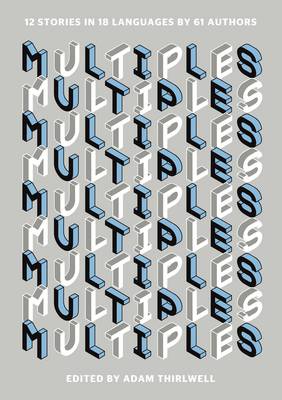With its McSweeney’s backing, and its editor being hyperactive literary jester Adam Thirlwell, it should come as no surprise Multiples feels like a constant tease. It’s one you feel obliged to indulge, but it risks leaving the reader rather cold.
First, there’s the arch premise. Have a writer of some repute translate a previously untranslated story. That translated text is then handed to a different writer, who translates it into another language, having not seen the original. That product is then passed to another writer, and so on until the pre-defined chain comes to an end. The all-star cast of players (Zadie Smith, Colm Tóibín, A.S. Byatt, David Mitchell, Ma Jian, amongst many other modern “luminaries”) are all encouraged to be as mischievous as they wish. Some try to stay true to the source text, others don’t give a damn, rearranging the form, the content, anything they please. Icelandic writer Sjón even rips up the translation process, having his son read the text to him. Three weeks later, Sjón produced his version from memory.
This filtration makes Multiples less about the original stories than about the ethics of translation. And somehow it ends up destabilising the entire notion of “truth” in literature. It lures the reader down philosophical rabbit holes, guiding them into tangential ponderings on language, its attempts to reveal pure meaning or some intangible essence apparently hiding behind the diaphanous curtain of the text. In the end, though, you feel there is no terra firma, no sacrosanct words. If you’re convinced of the positive power of literature, you may want to look away now.
Storytelling, no matter how serious the subject, can be reduced to just a game, Multiples suggests. Some of the authors hint as much in their notes on their “translations” (remember these are not translators at work, but authors, whose style can kill). Dave Eggers, in his typically droll way, explains why he tore away and distorted much of Kafka’s Das Tier In Der Synagogue, a narrative focusing on some unknowable creature living in a synagogue (or a “shul” or a “temple”, depending on which version you’re reading), by simply saying: “I took some liberties.” It’s funny. But it’s unnerving how insouciantly he messes with Kafka, who, it is said in another story entirely, “has no descendants”. This constant self-reflexiveness leaves us on shaky ground.
Inevitably, ethical problems emerge between the cracks of each version of a story, especially where the chasm between the translations are deep and wide. The first version of a Youseff Habchi El-Achkar tale, ‘The Four Seasons, Without Summer’, is an uncanny modernist first-person narrative flitting between periods of the Lebanese Civil War, its awful metastasis out from Beirut and into the country’s villages. It closes horrifically, the marks of war are literal, fingernails have scratched away at the face of a tertiary character brutally killed. Then Joe Dunthorne turns the thing into a ditty about nothing much at all that climaxes during the London riots, which, for all their madness, were hardly cataclysmic. Again, the juxtaposition is almost funny. But it feels wrong, offensive even. Translations are powerful things, whether good or bad. As Frédéric Beigbeder says later in the book, in pleading for forgiveness for his efforts: Traduttore, traditore.
If Multiples is a “serious” collection, one striving for a “discovery”, Multiples can be built up and torn down rather easily. Especially if you’re friendly with Foucault and Co. Let’s first accentuate the positives. In Multiples, it is more instructive to look for what survives from text to text, given the differences are so many. These surviving phrases – are they the closest to the “higher truth”? That phrase itself survives from Tóibín to Tom McCarthy in Enrique Vila-Matas’ ‘Los De Abajo’, a Borges-esque narrative about a narrative (the story is, like a handful of the others here, really about translation. The “history” book the narrator writes about becomes ‘different from the official version, and uniquely valuable’). Do these consistencies point to the “10 percent collective unconscious” Aaron Grunberg says is left in his copy? And does that collective unconsciousness conceal a “hidden truth”? You could easily suggest each author is a Kinbote to the source text’s Shade, but if there is some linguistic thread tying them together, it surely has “value”, no?
But then the self-awareness of Multiples, drawing attention away from the quality of the storytelling, and directing our critical gaze to the machinery of literature, undoes this optimistic interpretation. If you think about it for long enough anyway. For there is nothing “behind” language waiting to reveal itself. It is only language that connects, that is responsible for the collective unconscious. Let Foucault explain, in his commentary on commentary: ‘Commentary questions discourse as to what it says and intended to say; it tries to uncover that deeper meaning of speech that enables it to achieve an identity with itself, supposedly nearer to its essential truth… in stating what has been said, one has to re-state what has never been said.’ After everything, there is only language. And what is that worth?
But basta. These men are nihilists, there’s nothing to be afraid of. There is hope here somewhere. Joy even. Being the tease it is, Multiples makes you want to join in all the fun. If “professional” writers can kick it with Kierkegaard and Kafka, then you can too. Google Translate is your guide. Don’t worry, the esteemed players used the tool, the “nightmare-text” creator, as Péter Esterházy describes it. Look, here’s what I did to the opening paragraph of the Spanish translation of Richard Middleton’s ‘The Making of a Man’:
He was your typical office pussy. Was lost looking for Vauxhall station, traipsing vacant streets in the poor part of town, all but soiling himself, the unerring rain ruining his only coat. A figure shifted, a thief surely, but who else to ask? No, he couldn’t. Why hadn’t he gone to Waterloo, like Murray said? Where were the fucking police at this time of night? Why the hell didn’t he have an umbrella? Buggeration. Ah, but the houses, they were improving with each step. He was on the cusp of the gentrified quarter, each gabled roof pointing the way to sanctuary, to the ah! the A road.
I won’t punish you with the rest (although I think I’m better than Dunthorne. Someone give me a book deal, yes?). The message is that, despite Thirlwell’s anxieties over the success of the thing, there is a mini-utopian takeaway here. In his introduction, he frets the anthology is “entirely threatening”. But after his own wickedly good translation of Carlo Emilio Gadda’s ‘L’Incendio Di Via Keplero’, he says: ‘I’d always believed in the stern ethics of translation proposed by Nabokov or Kundera. But now I was wondering if everything could belong to everyone.’
We’re all “translators” now. We are all the arbiters of the signifier and the signified. And this, like Multiples, is fun.

Multiples is available now, published by Portobello Books


